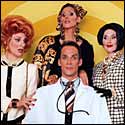| Arts & Entertainment >>> Art | Books & The Mix | Classical & Dance | Kids | Movies | Music & Nightlife | Theater | |||
| On the Fringe | |||
| What was worth seeing at The New York International Fringe Festival? Our guide to the good, bad, and ugly. | |||
| The 2003 festival ran from August 8th through August 24th. | |||
| Along the Way The vocal group Bob Ross Juice Box has created a fast-paced, frankly charming a capella musical about six twentysomethings trying to make it in the big city. We see them on the N train (Megan is trying to get a seat so she can do her makeup; Ali pines for her ex-boyfriend as she passes his stop) and then in various scenes above ground (Sophia the yuppie is trying to follow her bliss; Peter is trying to decide if he should move out of the city since he's about to be a father). While some of the lyrics, particularly in the title song, are a little precious, the show has much in common with Avenue Q. The characters' love for-and frustration with-New York is the subject of nearly every song: the inner rage engendered by temping, the mystery of Dr. Zizmor, the gay subtext of découpage, and that scary guy in Times Square who dances with a lifelike doll. Looks like a sleeper hit to us. —Ada Calhoun |
|||
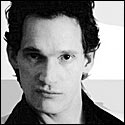 American Fabulous American FabulousIn real life, Jeffrey Strouth was a Midwestern drifter and amateur entertainer who ended up a fixture on the early eighties Manhattan nightlife scene. In the one-man show American Fabulous, star Troy Carson, who adapted the script from Strouth's own writing, recreates the Ohio native's journey from broken-home upbringing to prostitution to, ultimately, a gig at the legendary downtown club Area. Carson, who also produced the play, deserves credit for bringing this fascinating story to the stage down to the last detail (even though it required him to wear a fringed cowboy shirt). Still, the acting could be more precise, the writing is frequently repetitive, and the jokes are seldom funny. — Sean Kennedy |
|||
| Becky and Noelle: Investigating the Bucket Don't go into Becky Poole and Noelle Romano's bizarre and surprisingly hilarious variety hour expecting discernible punch lines. Their offbeat humor is all about the delivery, as in the opening scene, when Noelle plays a Russian peasant doing stand-up along with the somber tones provided by her accordion-playing sidekick. She uses a glare to the audience and a knee jerk to punctuate "jokes" like "I had a dream I was eating a giant marshmallow. When I woke up, my mother was gone." In addition to offering random skits, like ingenious imitations of "important" couples from Sonny and Cher to "two Italian guys stuck in the same shirt," the show also serves up an autobiographical account of their childhoods—Becky was prom queen, Noelle a misanthropic loser—told through tap dances and songs, many of which involve Becky's expert saw playing. Is the show cohesive? No. Does it matter? No again. Just roll with these girls. One of the most purely enjoyable experiences we've ever had at Fringe.— Jada Yuan |
|||
| Blake. . . Da Musical "It's a story of love, a story of hate / The tragedy of Bonny and Blake. . ." goes the catchy opening song of this deliriously funny, utterly adorable musical based on the real-life murder of Bonny Blake by her husband Robert, the star of the seventies TV show Baretta. Is it bad taste to do a show about a murder victim? Sure, but writer-director-star Rick Batalla is remarkably affectionate towards his subjects. Forces are consipring against the Blakes, specifically Bonny's "Fairy White Trash Star Fucker Grandmother" and Robert's jealous Baretta co-star, a bird named Fred. Bonny (played by a divine Meleney Humphrey) may be a ditz and a slut, and unable to bend her legs because her jeans are so tight, but she's sincere. Every moment in the show is more endearingly absurd than the next, from the power ballad about Robert's dyslexia to the final song with its powerful moral about how tragedies like this might be avoided in the future: "Duck!" —Ada Calhoun |
|||
| "Buddy" Cianci: The Musical Professionalism has been on the rise at Fringe ever since Urinetown hit big, and with a big-voiced Off Broadway-caliber cast (notably David Stern in the lead), this trip through the life of Vincent "Buddy" Cianci—the wildly corrupt, highly entertaining former mayor of Providence, Rhode Island—continues the trend. But skilled performers can't make up for a script that actually decreases our interest in the man who, while in office, was convicted of kidnapping his ex-wife's presumed lover, only to be incarcerated for racketeering during his second stint as mayor. The salsa-tinged "May I Shake Your Hand" and "The Armpit of New England" (Providence's nickname before Buddy cleaned things up) add spice, but mostly this feels like a very reverential political science lecture. One headline-making event follows another-Buddy hires crow-bar-wielding strikebreakers! Buddy uses building contracts to pay favors! This isn't a portrait; it's a greatest-hits reel, neither capturing the appeal of wrongdoing like The Producers, nor creating a fearsome icon like All the King's Men. —Jada Yuan |
|||
| Caresses Whatever "dark intelligence" Variety saw in this Catalan drama is absent in this show's North American premiere. Based on Schnitzler's La Ronde, each scene explores the relationship between two characters-husband and wife, father and daughter, boy and homeless man-aiming to provide insight into love. The actors' emotional meters seem permanently pointed to angry, pathetic, or crazy. They pause at unnatural points and step on each others' lines-lines that often seem to have no topical correlation. And while we didn't need to see a real-time blow-job pantomime (as in 10 minutes of grunting and head-bobbing) or a nude enactment of a father taking a bath with his adolescent son, we were more appalled by the script's unrelenting strings of curse words-is "slut bitch whore" more insulting than any of those terms on its own? —Jada Yuan |
|||
| Cats Talk Back If you've been plagued these past few years with unanswered questions about the closed "Broadway smash hit" Cats (Were some of the felines lovers? How does one become a "cat"?) look no further. From a sold-out run at the student-operated Yale Cabaret in 2001 comes this delightful, if inconsequential, imagined panel discussion with five former cast members, each in varying stages of decline, from the eighteen-year vet Monique (Jackson Gay) whose fingers can now form only claws to the gloriously self-absorbed Hector (a terrific Frank Liotti), who has his head shot and résumé waiting for you at the door. The renditions of the lost "Cats Kill" number-about mauling a three-year-old girl-and the Method discussions may be a bit too drama-student for Fringe, but, as Hector says, "You Fringe Festival people think that because you live in Williamsburg and eat ramen noodles you're serious artists doing real theater. But. . . if Broadway ever came knocking, you'd be running as fast as you can say Urinetown!" —Jada Yuan |
|||
| The Celebrated Jumping Frog of Calaveras County A brilliantly funny adaptation of the Mark Twain short story, perhaps as imagined by the Coen brothers, Jumping Frog is a musical retelling of the fortunes and misfortunes of Jim Smiley, a happy-go-unlucky gambling addict who wanders into Calaveras County and winds up married to the lovely Molly Wheeler. Trouble soon arrives in the form of Virgil Slade, "a real bad egg" who's all too eager to take advantage of impulse-control-impaired Jim. The production manages to be both old-timey and postmodern, as the Calaverasites—including Ham Sandwich, a reluctant lug of a performer who'd rather be out on a date, and Louella, a lisping puppeteer who gets the show's best lines—re-enact their own roles in Jim's downfall, with hilarious results. —Matt Gross |
|||
| Comedy for Dummies "Grade Seven Theater" is just one of the many skits in this hourlong collection of Second City-style bits by a threesome of Canadians. The gimmick is that it's supposedly written by seventh-graders, and the themes are what you'd expect from prepubescent boys-human excrement, "my first boner," and the like. In the end, they're about as funny as the jokes proffered in junior-high locker rooms. But while it's easy to forgive seventh graders for poor taste and puerility, it's not quite so easy to forgive grown men. The three actors presumably teaching the audience about sketch comedy spend much of their time unintentionally demonstrating pitfalls to avoid, like poor timing and Saturday Night Live-style premise overload. There are some chuckleworthy moments, though. One sketch, in which a woman in her twenties learns that she is not, in fact, mentally challenged brought down the house (you had to be there). Clearly, un-PC humor appeals to grownups, too. —Ellen Carpenter |
|||
|
Drip |
|||
| expat/inferno Alejandro Morales's smart expat/inferno uses both the American overseas experience and Dante's Inferno to create a kind of otherworldly urban European fantasia. Appropriating major elements from Dante and set in Paris after 9/11, the play depicts one young New Yorker coming to grips with the mysterious loss of his boyfriend. In the process, he is followed by an older woman who may or may not be his mother and seduced by a punk-rock bookkeeper, and has a date with destiny at the club L'Inferno—all while repeatedly bumping into an antidepressant-popping lounge singer named Beatrice who wears a flame-red cocktail dress and always seems to have a glass of champagne in her hand. By turns very funny and touching, not least because of the convincing cast. — Sean Kennedy |
|||
| Exploring Dementia! Really, the only problem with this show is its name. Wrongly subtitled "the show your mom was afraid of," this eight-sketch comedy isn't so much a disturbing look at characters going mad but rather an hour of light-hearted fun. Written and performed by Will Matthews and Cassandra Smith, the show takes you through the gamut of comedic styles, from screwball to slapstick and even noir. Whether sharing the stage or acting alone, Matthews and Smith exhibit an enthusiasm for performance that is as refreshing as it is entertaining. Matthews shines as a wannabe British punk rocker, and Smith displays her flair for physical comedy as an over-the-top sports mom (very Cheri Oteri). The best of the scenes is the last, where the two hilariously speed-talk their way through the entire sketch while pretending they are trying to outdo one another. No, Exploring Dementia! is not the show your mom was afraid of. But it's certainly a show that these two breakthrough performers's moms—as well as they themselves—can be proud of. —E. J. Samson |
|||
| Freedom of Speech Eliza Jane Schneider—Anna Deavere Smith crossed with Amy Sedaris—uncannily channels some 30 real-life Americans and their crazy-quilt stories in her tour-de-force one-woman show Freedom of Speech. Billed as a "documentary" play, Schneider, whose day job is doing the voices for numerous characters on South Park, spent 10 years traversing the country and interviewing the people she ran into, ostensibly studying local dialects. Though a book documenting her research is in the works, the immediate fruit of her efforts is this remarkable showcase of average citizens speaking their minds, from a Chippewa Indian artist in Minnesota to a turkey-hunting Arkansan fiddler who plays an awe-inspiring "Devil Went Down to Georgia." Schneider doesn't so much act as literally summon each person right before your eyes. — Sean Kennedy |
|||
| The Geldings Because men don't talk about their, ahem, Old Chaps enough already, now we have a play that really drives the subject home. In this Western-style farce, we meet the Gelding brothers, a trio of country boys with no bulges in their pants. Handsome Flem Gelding, the eldest, has a bright idea of faking a John Thomas by keeping a small—and very much alive—rodent in his underwear to impress the Widow Claire at the local saloon. But no vermin—even sans claws—can make up for a missing Mr. Happy. The thing is, that's not all that's missing from this play. What about acting, direction, and dialogue? One the up side, the Singing Cowboy—basically the Jonathan Richman character in There's Something About Mary—sums up the absurdity of the scenes in funny sound-bite-size songs. "What counts is not measured in inches," the Cowboy croons. "What counts is the heart of the man." Yeah, right. —Ellen Carpenter |
|||
| The Hermitage of an Exiled Chain Smoker Expanded by (and starring) Michael Cyril Creighton, The Hermitage of an Exiled Chain Smoker grew out of a friend's monologue written before the smoking ban took effect. But don't come in expecting a hail of anti-Bloomberg jokes: This is intended more as a character study, a humorous look at a bitter man who manages to blame all that is wrong with life on everything but himself, from the new smoking law to his absentee mother. Take, as an example, Caleb's behavior when the smoking law takes effect: He barricades himself in his apartment. The truth of the matter is that Caleb, a self-proclaimed "social retard," shut himself off from the world long before the ban hit. Still, there are several very funny, if repetitive moments in the show (an asthmatic, Caleb loses his breath whenever he lies). But truth-in-advertising laws—not to say a product warning label—might have required this to be called "The Hermitage of a Socially Inept Recluse Who Smokes a Lot." —E. J. Samson |
|||
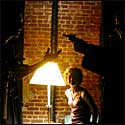 How to Act Around Cops How to Act Around CopsMost of the usual cop-show suspects are involved here-drugs, guns, bodies in car trunks, but How to Act Around Cops, with a witty script and as many twists as can fit into 90 minutes, revamps a tired genre. Most of the characters straddle the line between charmingly idiosyncratic and deranged, providing some remarkably well-timed and compelling dialogue. A few scenes are uncomfortable to watch, including a prolonged epileptic seizure (complete with mouth foam) and the probing of a fresh bullet wound. But there's plenty of comedic relief, especially when an unlikely love affair develops between the kidnapper and his hostage ("You'd dissolve a body in acid for me?" "For us!"). The performances are riveting, though regrettably obscured by the dim lighting. While the ending is overly dramatic, How to Act Around Cops is an intelligent play that questions the dichotomies of law and transgression, cop and criminal, exposing the diabolical tendencies lurking in every one of us. —Elaine Stuart |
|||
| Loud The title says it all. Billed as "an electronic rock opera," Peter Flint's musical about five interconnected individuals who want more out of life also leaves the audience wanting more out of this low-budget production (the set consisted of a few chairs and stools, and the microphones worked only occasionally). One wonders what possessed music director Jeffrey Forte to create an electronic-rock score for a show about life in a Florida suburb. With characters like Linda, an underappreciated wife; Payne, her closeted husband; and Parker, their rebellious teen, you can't help feeling like you've seen this before-and you probably have, except much better. Still, Loud has some catchy tunes and noteworthy performances, especially from its female cast. Look out for scene-stealer Clark Mims, whose big voice and talent far surpass the material she has to work with. In the end, Loud tries too hard at being a suburban Rent and is nowhere near as poignant. —E. J. Samson |
|||
| Love: A Multiple-Choice Question Love is a lot of things in this one-man musical by Australia's Jamie Jackson (with live piano accompaniment by SoHee Youn). Among the adjectives employed: "pitiless," "typical," "difficult," "big," and "rare." Upset with his current girlfriend, Jackson takes a Back to the Future-style trip to the outback, "where they know about love," and interviews his family on the subject. Jackson, a deft impersonator, portrays each of his kooky relatives, all of whom turn out to be far gloomier than he remembered. There are some insights into the ways in which we glorify or vilify our families, but then it's back to defining l'amour. And just when you think the show's going to end without a Snoopy-style love-is-a-warm-puppy moment, here comes crippled-pup Sam to offer some wise words like, "Love ain't science." Even Jackson's childhood self weighs in. Ultimately, it turns out "Love is D: all of the above." Full marks for staying on topic. —Ada Calhoun |
|||
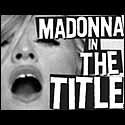 Madonna in the Title Madonna in the TitleTwo dumb, pretentious guys convince one's wife to commit suicide so they can produce a play with Madonna in the lead role (or at least in the title, to dupe audiences into coming). The two men are having an affair, although in the process both wonder if they're really gay and one falls in love with a drag queen. Drug use is rampant. Will & Grace-style bitchiness is the order of the day, and mean jokes are delivered martini glass in hand. There are some clever riffs about Ian Schrager hotels and TiVo, and some crass gags involving anal sex and vomit, but the Madonna material is the most substantial, particularly the "Like a Prayer" lip-synch number. The jokes about her save this play. —Ada Calhoun |
|||
| Meaningless Sex Though this wannabe-provocative musical is clearly indebted to Sex and the City—and in fact recycles many of that series's well-worn tropes-it comes across more like Beverly Hills 90210 in its youthful melodramatics. But 90210 was fun to watch, and for the most part, so is this playful show about the romantic lives of four young New York actors. With songs like "Fuck Friends" and "If Only I Were Gay" (wherein the straight male character sings about the supposed benefits of switching teams), it certainly doesn't lack for laughs—and the music, composed by an avowed Sondheim aficionado, isn't bad either. Yet as much as the four main characters want to be daring and truly live out the title, the story ends conventionally enough-and disappointingly-when love and fidelity triumph over base desire. Samantha would never approve. — Sean Kennedy |
|||
| Nharcolepsy In the first few moments of this madcap interactive show, a hand emerges creepily from a zipped duffel bag to set the scene by affixing two plastic figurines (the main characters) onto the top of a blue ball (the earth) and then spraying them with shaving cream (snow). If that doesn't sound like your bag, you may want to call it quits-after, presumably, turning in the wadded-up "snowballs" you were handed as you entered the theater. Comedians Richard Harrington and Chris Kauffman star as a Belgian cabaret singer and his bumbling, near-mute assistant, traveling together to the North Pole in search of the infamous Yeti. Such high-concept stuff (two men performing one final cabaret act before freezing to death) requires a deft comedic hand, and Harrington and Kauffman's efforts sometimes call to mind a mediocre middle-school talent show. Nevertheless, when Harrington plays the zither or when Kauffman does one of his many masterful mimes, only the toughest audience member could resist their charm. —Sara Cardace |
|||
| One Shot Robert De Niro fans will get a huge kick out of this one-man show, which delivers a masterly look into the mind of a sociopath who's obsessed with the actor and all of his films. Mark Kilmurry stars as Charlie, the fixated fan for whom life is viewed through a pure-De Niro lens. Monologues from Raging Bull take the place of regular conversation, a woman is loved (and stalked) because of her similarity to Jodie Foster's Iris in Taxi Driver, and the entire nerve-wracking tale is told in the form of a letter written to—who else?—Bob himself. If Kilmurry's physical mimes aren't always up to snuff—it took us several minutes to realize he was mimicking scenes shot in slow-motion—his channeling of characters like Jake La Motta and Travis Bickle barely leaves room for improvement. And Kilmurry so convincingly portrays a madman just keeping in his rage that attendees can't help but shrink in their seats when he points his gun their way. You'll never hear "You talkin' to me?" the same way again—and you've got to wonder whether the obsessive fan in the script is the man onstage himself. —Sara Cardace |
|||
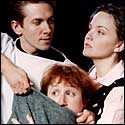 Pale Idiot Pale IdiotKirk Lynn’s Lipstick Traces went from the Ice Factory Festival to a successful Off Broadway run in spring 2001, and now expat Texan theater group Frozen No Salt Productions is bringing to Lynn’s Pale Idiot (cast pictured, left to right: Shawn Fagan, Roxy Becker, and Lisa Louttit), a fast-paced 1996 farce about a health inspector who comes to town to administer the zany “Idiot Test” to, among others, the local politicians. Lynn, playwright-in-residence for Austin’s Rude Mechanicals, had all but forgotten the play: When Frozen No Salt’s Roxy Becker, who was in Idiot’s original cast, called to ask Lynn for permission to do the show in New York, he went back and read it for the first time in years. He found it “desperately clever” and “kind of silly”—in stark contrast to Lynn’s current project, a contemporary retelling of the Book of Job. —Ada Calhoun |
|||
| Pinafore! The good efforts of Gilbert and Sullivan societies worldwide notwithstanding, it's hard to keep satirists' paws off their ultra-British operettas. One particularly aggressive parodist is adaptor-director Mark Savage, who serves up this 2 1/2-hour gay adaptation of H.M.S. Pinafore. The Pinafore is "a floating circuit party" in the "separate-but-equal gay navy," and Captain Corkinit never ("Hardly ever!") sleeps with his crew. The choreography is delighfully dopey (including some very sprightly marching), and the costumes darling (bandannas, short-shorts, and A-line crop-tops). But the new characters and lyrics are far from revelatory, e.g., sweet little Buttercup becomes fag-hag Bitter Butterball (though nicely played by Debra Lane). It's all very Naked Boys Singing—Savage co-authored that show, in fact—and Pinafore! may well share its destiny: a cheerfully vulgar babefest with a nice long run. But Sirs William and Arthur are spinning in their graves. —Ada Calhoun |
|||
| Poop: A True Story Despite its early reliance on stereotypes for laughs—flighty French women and swishy art-world denizens are so funny!—Poop: A True Story develops into a smart meditation on art and its ability (or lack thereof) to draw people together. Poop is about M., a struggling actress hired by a Japanese artist to sit on a metal folding chair in a gallery next to what he calls her "beautiful evacuation"—the titular excrement. M. herself (Micheline Auger, who wrote the play) narrates the story, interacting with the folks who wander into the gallery and trying to come to terms with her ridiculous situation, triggering a humorous twist when her poop takes on a life of its own. A load of fun.— Matt Gross |
|||
| Poseidon! An Upside Down Musical This may be the first time in Fringe history that an ocean liner has inverted onstage. Yes, the effect is accomplished mostly through screams of terror, 25 actors "falling" stage right, a strobe light, and plastic champagne glasses flying through the air, but it's a damn impressive homage to the 1972 disaster film The Poseidon Adventure. (Truth be told, the capsizing scene in the original is almost as cheesy.) For fans of the film (judging by the many Websites, a devoted bunch), the show is an opportunity to hear favorite lines ("Air pockets?!") spoken and sung by a delightful cast, including the suitably sexy Molly Faithe in the Stella Stevens role. Non-cultists won't get all the jokes, of course, although, in a rather heavy-handed conceit, monologues about the film's cultural and personal import are peppered throughout. But everyone can appreciate songs like "(In the Water) I'm a Very Skinny Lady" and the thrill of trying to guess, as the ads urged, who will survive. —Ada Calhoun |
|||
| Rockshow Writer/director Paul Stancato set out to "redefine the bounds of traditional theatre" with his backstage musical Rockshow. Unfortunately, he hits every cliché out there. Group Therapy's guitarist Adam must choose between his friends and a big solo-act contract. Bass player Mary finds herself increasingly attracted to Adam. Front man Bobby is too in love with financial investor Christine to see that she's trying to take over, but drummer Michael sees right through her. You would hope that the music, at least, could save things, but for the most part the songs have nothing to do with the plot, making them unnecessary breaks in a production that's already overlong. Rockshow may be something new, but we've seen all the component parts one too many times already. — E. J. Samson |
|||
Surely in these days of Extreme Makeover, Nip/Tuck, and all-botox-all-the-time, plastic surgery and cosmetic procedures should be a rich enough subject to make compelling theater. But while the creators and stars of Scalpel, a wildly campy romp of a "rock musical" about Upper East Side socialites and their surgical vices, certainly try their hardest, they don't quite get under its skin. All the promising satirical possibilities are sacrificed to the tired conventions of a murder mystery. The cast members seem to be enjoying themselves, though, and it helps that they're constantly reeling off hysterical one-liners. And while the music may be forgettable, drag queen Candis Cayne, who nearly steals the show as one particularly, um, enhanced socialite, never is. Worth a visit just to catch her star turn. — Sean Kennedy |
|||
| The Semen Tree In this "one-man musical tale about growing up Gaysian-American," the likeable Angel Abcede explores how childhood experiences can shape the discovery of one's sexuality. Thrown in this autobiographical mix are Abcede's self-admitted obsession with white America, his relationship with his Filipino family (and his relations with some of his relatives), and his life as a columnist for a Chicago gay magazine. He even puts to rest some popular myths: Do Asian men really refuse to date other Asian men? Do Asian men really have small penises? (By the end of his performance Abcede supplies his answer—shows it, in fact.) The musical numbers aren't the best out there, but his enthusiasm is infectious. He may not be as funny as Margaret Cho, but at least there's another Asian out there talking about gay culture—and he has better jazz hands. — E. J. Samson |
|||
 Slut SlutA big hit of the current Fringe Festival is the musical Slut, by Stephen Sislen and Ben Winters, said by its spunky director, Sarah Gurfield, to explore that bit of slut in everyone, whether in the traditional or the self-promotional sense. Between them, the co-authors have a background in journalism, playwriting, filmmaking, playing in a punk-rock band, and running a transcription service, and so seem well qualified in at least the secondary type of sluttishness. Their plot concerns the roommates Dan, a med-school grad eager to publish a scientific book, and Adam, a Lothario specializing in one-night stands who hopes to sail around the world in his boat, thus globalizing his sleeping-around. To discuss Dan’s joining in as first mate, the two adjourn to a bar, where Adam hits on Delia, a would-be rock star, but she chooses to move in with the shy and scholarly Dan. Other characters include two girlfriends of Delia’s, one a swinger, the other risking marriage to a rich Long Islander, as well as a generous assortment of downtown barflies and other purportedly colorful types. Also, amusingly, the ghost of Ferdinand Magellan, who cautions Adam about the sea. No one, however, cautioned the authors about a sporadically droll but basically creaky book full of all-too-predictable surprises. The music, too, is predictable, with only one flavorous number. But at least, unlike that of Urinetown, whose success it hopes to emulate, it does not leech on Kurt Weill. It is enthusiastically played by the musical co-directors Amy and David Southerland, and three others. The songs are well rendered by a dedicated cast of nine playing 33 parts, in which Stephen Bienskie, as Adam—admittedly the meatiest role—is most impressive, although several others also show potential. Gurfield’s direction deals resourcefully with a limited budget and the cramped space of the un-air-conditioned Wings Theatre, which, on a hot night, doubles as a steam bath. Though much workshopped, the show is still in development, more slutlet than slut, and in need of added pizazz. I am especially amazed by its elevating one sexual infidelity into a turning point of the plot: Even Puccini’s bohemians could do better than that. Still, if the creepier Urinetown could make it thanks to anointment by the Times’ second-stringer, why not this? —John Simon |
|||
| Strange News from Another Planet In this apocalyptic rock-and-roll fairy tale, two outsiders in the form of a time-traveling writer and a young man clad in a sparkly green jumpsuit fall from the sky (literally) during World War Whatever, and discover "the nature of mayhem." Each scene features a flashy rock ballad in which a cast member completely interrupts the flow of the production, walks up to a mic at the front of the stage and gives his or her best rock star impersonation. The music is engaging—think David Bowie, Smashing Pumpkins, and Starship melded together—but the performers simply don't have rock-star charisma or moves. They're not comfortable with the mike, and their voices simply aren't rockin' enough. The show itself is too disconnected and the acting is inconsistent. At the end of the show, the green-jump-suited outsider sings, "This is not my war. This isn't my land." Though his war is fictitious, his statement is as real as it gets.— Ellen Carpenter |
|||
| Synesthesia The title refers to a condition in which one's senses are interconnected: Numbers have color, sounds have flavor, perfumes look pentagonal. But for people watching Synesthesia, a two-acter about a Ukrainian murder probe, disconnectedness is the rule. Why, for example, is Kiev inspector Louis Yevchenko asking Lydia Perova, a conservatory professor, about the musical significance of the numbers six and seven? Shouldn't he get on with his investigation into the deaths of two of Perova's colleagues? (Apparently not—that wouldn't let the writer-director Lance Tait show off his knowledge of avant-garde composers and Wagnerian anti-symphonism.) As Yevchenko coaxes musicological tidbits out of Perova, she just sits around plinking out high-Cs on her Casio and looking bored. The actress, Stephanie Campion, can handle that pretty well, but as the plot develops, she's called on for a bit more, and the promised "shattering climax" provokes a torrent of giggles. —Matt Gross |
|||
| A Taste of Heaven Based on the journal of a Victorian poet, A Taste of Heaven is a very touching tale of male intimacy and true love. Ryan Belmont and Rob Luke are college friends in the late nineteenth century trying to reconcile their growing feelings toward each other with the demands of a traditional society. Michael D. Jackson's very simple writing gets the audience to fall in love with the two characters during the course of their romance—and leaves them just as heartbroken by the end when the limitations on their love are driven home. As the womanizing Belmont who can't seem to explain why he is so fond of his friend, Richard Gallagher has great charisma (and a melting smile to boot). Equally charming is Andy Phelan, whose Luke is played with great innocence as he struggles to find a reason why the love he has could possibly be so wrong. With their convincing performances and great chemistry, you can't help asking the same question. — E. J. Samson |
|||
| Tower of Babble Anyone who's done time in an office knows about the inanities of corporatespeak, the subtleties of office politics, and the soul-crushing sense of cog-in-the-machine insignificance. In her one-woman show, the charming young actress-comedian Jennifer Ostrega portrays a variety of office types, from the Lily Tomlinesque customer-support drone to the hate-filled New Age counselor. Despite some sharp jokes-the human-resources director, for example, confirms that "Dress-Down Friday" is, in fact, a set-up-most of her material is pretty thin. So what's the point of this show, given that the surrealities of the working world have already been skewered everywhere from 9 to 5 to Dilbert to last season's Off Broadway show Hold Please? Clearly Tower of Babble, which at under 50 minutes would please any efficiency expert, is intended as a showcase for Ostrega's comic flexibility, which is notable. Casting agents take note. —Ada Cardace |
|||
| Tri-Sci-Fi: A Chillogy Did aliens abduct Henry David Thoreau? Do space creatures play the baritone sax? Tri-Sci-Fi: A Chillogy says yes. While these three bite-size musicals have very different plots, they do have one thing in common: wonderful music. Half of the cast members in Tri-Sci-Fi are in a professional a cappella group, and their harmonies are tight and their voices blend perfectly. The songs are funny and the melodies memorable. Some of the most hilarious lines come from Thoreau's Walden: "I did not read books the first summer," Monte Wheeler belts in a strong baritone, "I hoed beans." (Who knew Walden was so amusing?) The musicals' stories aren't as impressive as the songs, sadly. "Ed Wood, Jr.: The Sinister Urge" is downright confusing for the non-cinéast. The acting, however, keeps up with the music, especially a hilarious performance by Dennis Deal. "He's like Jerry Orbach on acid!" a lady in the third row loudly noted. Indeed. —Ellen Carpenter |
|||
| Tuesdays & Sundays The two red-cheeked stars of this dreamy drama meet on New Years Eve in 1887, in a time when teenage boys are dubbed "gentleman callers" and young couples fall sweetly in love at chaperoned church dances. Both Mary and Will are prone to paralyzing shyness and use words like "Shucks" with abandon—but don't head for the doors just yet! Actors Daniel Arnold and Medina Hahn, who co-wrote the script as well, deliver refreshing, poignant performances that transcend the hokey setting. When Arnold's Will, all Adam's apple, is struck dumb at Mary's late-night invitation to come inside, his desperate inner monologue ("Yes, I would! I very much would!") strikes crushingly home. Likewise, Mary's bashful grimace throughout most of the play so transforms her face that she is almost unrecognizable come curtain call. Anyone who isn't moved by their awkward, wide-eyed interactions—as well as the tragic final scene that ends their affair—was never a teenager. —Sara Cardace |
|||
| The Writer's Mind Not since Boogie Nights has an organ played such a prominent role. A slab of fleshy, pink meat on a pristine white plate takes the title role in "Scenes from the Life and Times of Little Billy Liver," the second of the three one-acts that make up "The Writer's Mind." Born without a heart, a brain, lungs, arms, legs or, well, anything other than a liver, Billy embraces the fact that he is, as his mom says, "special." Billy does not talk or move, but people love him. The gas-station attendant who hires Billy and thinks of him as a son breaks down when he finally has to fire Billy: "God damn it! A person needs arms and legs to pump gas!" An agent sees talent in Billy, a photographer sees a desirable darkness, a straight man finds love and Billy, in turn, finds the bottle. Quick, jump-cut-style direction and excellent acting make this the best of the three playlets.The other two are "Harelip and Sputnik," which is overacted and silly, and "The Writer's Mind," a clever extended monologue that bashes actors and audiences. —Ellen Carpenter |
|||
